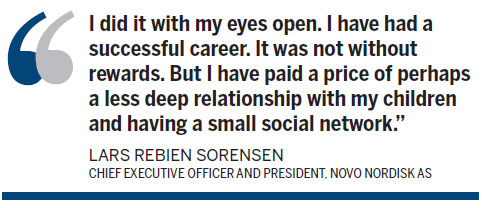Now the current oral insulin development is going smoothly, the CEO and president said he believes Novo Nordisk's technology edge will help it maintain a leading position in the world. Emerging markets, including China, are priorities.
Novo Nordisk China has been maintaining double-digit growth for the last 10 years, according to Sorensen. So far, around 15 percent of the company's sales are from China. Novo Nordisk now has around 60 percent of China's insulin market.
Because of fierce competition, the company's market share is unlikely to surge dramatically in China. On the other hand, because of the noticeable increase in diabetes treatment expenditure, sales increases are expected to continue.
China's diabetes prevalence has increased from 1 percent per capita in 1980 to 12 percent in 2012, which is even higher than the United States at 11.3 percent. China now has 148 million people with pre-diabetes - one in six adults - on top of an existing 98.4 million diabetes patients.
Considering each year, 6 to 7 percent of those with pre-diabetes will be added to the diabetes population, the number of patients is forecast to reach 130 million by 2030, according to the International Diabetes Federation.
Novo Nordisk invested $100 million to establish a new R&D center in November 2011 in Beijing, which is the company's biggest outside Denmark. It set up an R&D Center in Beijing in 2002, which was the first multinational pharmaceutical company established R&D Center in China. The new center is using the skills and knowledge of Chinese scientists, academies, universities and other resources and directly reports to its Copenhagen R&D headquarters. The collaboration achievements coming out of China's R&D center are used globally, while the center gives Novo Nordisk a lot of know-how in transferring to the Chinese market.
Company's icon
Sorensen is regarded as an icon of the Denmark-based multinational company. He is tall, energetic, extrovert, open-minded and friendly.
He always tries to be curious about learning new things, of understanding complex problems, of understanding different cultures - the prerequisites of being open and accessible.

Joining Novo Nordisk after graduating from university, he has always been very competitive and ambitious, always wanting to be the best at everything. "But I have to admit, with age and becoming slightly more mature, I allow myself not to win all the time and to realize that there are people doing things better than me. That is called collaboration."
That's also a way to lead a big multinational company. Being in a company for about 30 years, Sorensen said he has become a role model. "It's in a way like the relationship between a parent and children although not necessarily in exactly the same way. Children will do what you do but not what you say. I found out very quickly that if I did something people will pay attention to it."
Sorensen is respected by employees and colleagues. However, he said: "I have to admit that I'm perhaps not as extrovert a person as I may seem. I have to work at my job. Sometimes I get too tired to be extrovert or sociable. But it usually only happens when I get home."
Career success is accompanied by a high sense of responsibility and diligent work, for which Sorensen thanks his wife's support. Because of that he was able to dedicate himself to his career.
"I was working too much and I was not attending my children's school graduations and things you have to do to be a part of a family," he said. "Life is not perfect. You have to choose."
This aspect of his life has become better as Sorensen has become older. "I've become better going home in the evening and not sitting at work too late," he said.
When some young employees ask him how to become the CEO of Novo Nordisk one day. Sorensen said: "First of all, I have to retire. And you have to think about it carefully. Because arriving at the level I have requires an extraordinary amount of work and lots of traveling and being away from the family.
"You need to make up your mind whether this is really what you want. If you believe this, then you go for it and try to work hard. But you'll be paid very well," he said.